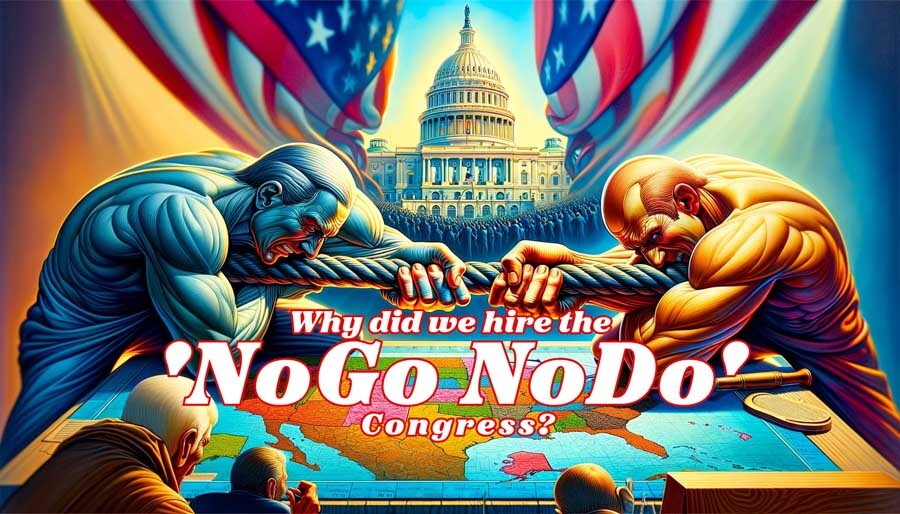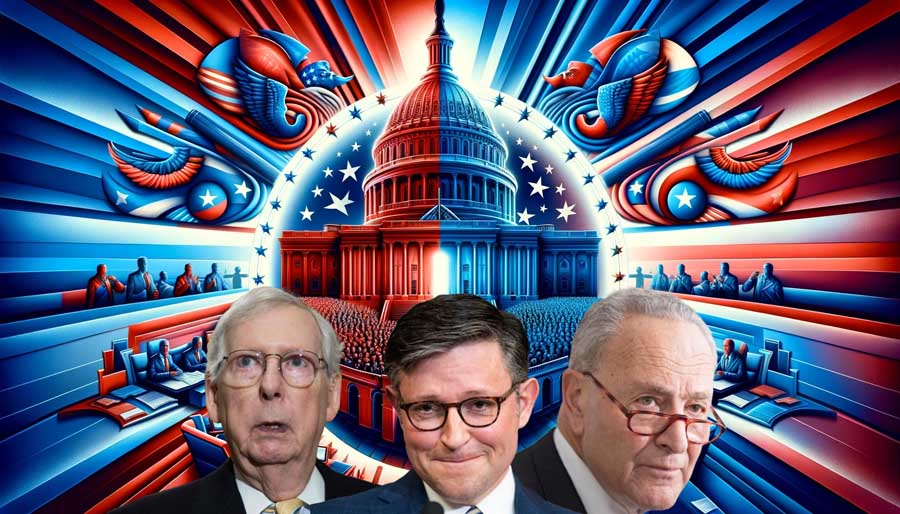
Posted by - News Staff![]() \
\
January 2, 2024 \
Filed in - Politics \
Schumer McConnell congress GOP Dems two-Party-System Johnson \
2.3K views \ 0 reviews
DLNews Politics:
As we delve deeper into 2024, the United States confronts a stark reality in its political arena. The Congress, colloquially dubbed the 'NoGo NoDo' for its perceived inaction, stands at the crossroads of a deepening partisan divide. This division is not just a matter of differing opinions but a fundamental challenge to the efficacy of our two-party system. Does it truly serve the diverse needs of the American populace, or are we on the brink of needing a comprehensive overhaul in our approach to governance?
The current climate in Congress, embroiled in partisanship, significantly affects critical decisions on pivotal issues such as border control, global conflicts, and the domestic quandaries of inflation and crime. The escalation of these divides can be traced back to the fervor surrounding the upcoming 2024 elections, where the spotlight is intensely focused on the race for the White House and key congressional seats. This intense focus must be more consistent with the legislative process and priorities.
A pressing concern is the looming government shutdown, with deadlines in January and February. The heart of the matter lies in reaching a consensus on sensitive topics like border security and foreign aid, notably for Ukraine and Israel. The rhetoric surrounding these topics, often leveraged as tools in presidential campaigns, only amplifies their contentious nature.

The Congressional leaders, Senate Majority Leader Chuck Schumer and Minority Leader Mitch McConnell, acknowledged the hurdles in these negotiations. A significant stumbling block is the conciliation between the Senate's agreement and its passage in the GOP-controlled House, where substantial opposition exists to additional aid for Ukraine.
Furthermore, the urgency of government funding looms large. With two shutdown deadlines imminent and only stopgap legislation in place, Congress faces the daunting task of passing full-year spending bills. This challenge is compounded by the limited time available and the hesitation of key lawmakers to agree to a year-long continuing resolution, particularly due to its implications for defense funding.
The dynamics within the House add to the complexity. Speaker Mike Johnson grapples with a narrow vote margin and leadership challenges, particularly in light of the GOP's formalized impeachment inquiry into President Joe Biden. While this inquiry enjoys unanimous GOP support, it has yet to reveal significant misconduct by the President, posing a potential political risk for moderate Republicans.
In conclusion, the increased partisanship in Congress, fueled by the impending elections, impedes resolving urgent issues. The relentless focus on electoral gains and divisive subjects like border security and foreign aid hinders bipartisan cooperation. Internal party dynamics and leadership challenges, especially within the Republican Party, further complicate the situation. This state of affairs underscores the urgent need for a more collaborative and less politically motivated approach to governance, prompting a reevaluation of whether the two-party system, as it currently stands, is effectively serving the American people."

Desert Local News is an invitation-only, members-based publication built on fact-checked, non-biased journalism.
All articles are publicly visible and free to read, but participation is reserved for members—comments and discussion require an invitation to join.
We cover local, state, and world news with clarity and context, free from political agendas, outrage, or misinformation.
Comments